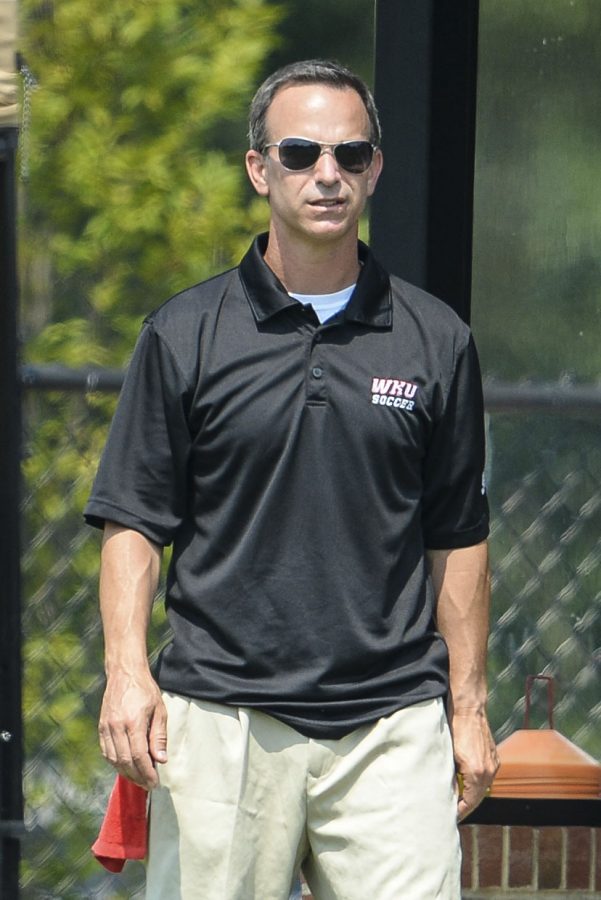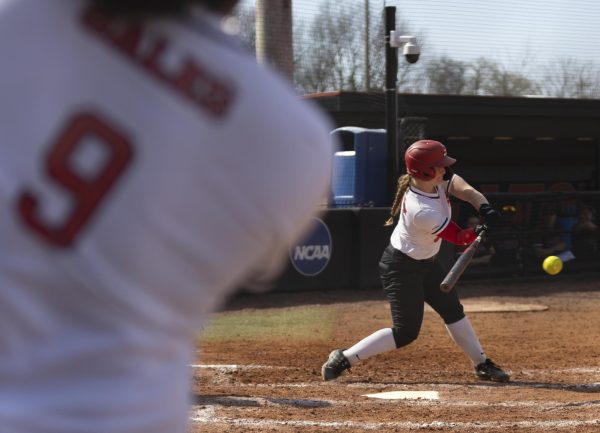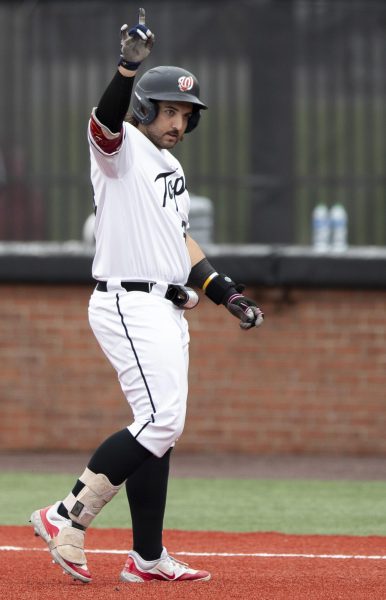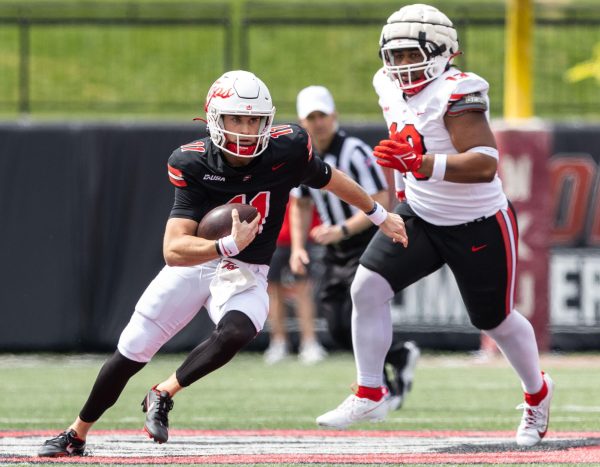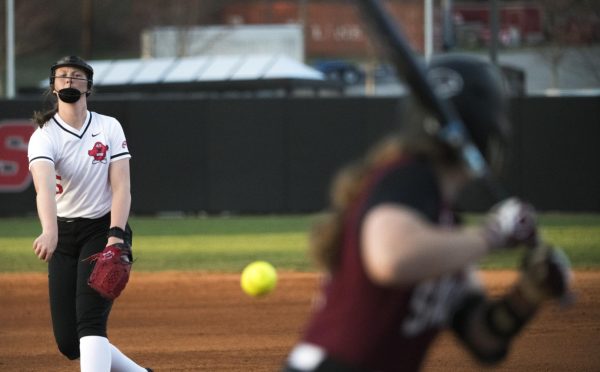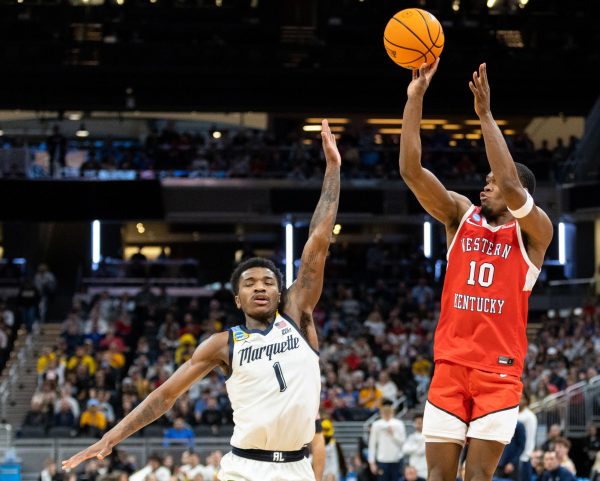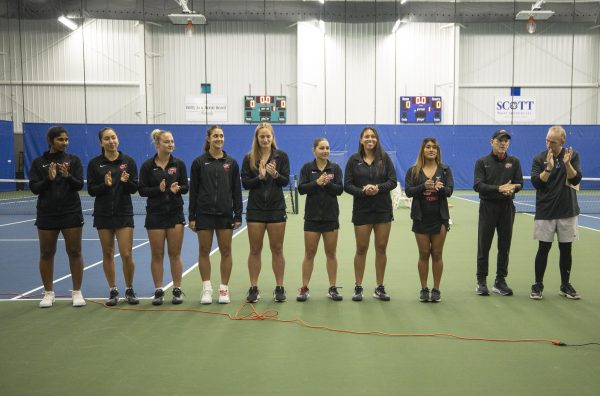From The Ground Up: Jason Neidell’s journey in building a championship program
July 9, 2014
When Jason Neidell came to WKU as head women’s soccer coach in 2001, he faced the task of starting a successful Division I program from the ground up. Neidell’s first Division I head coaching job landed him in a state he never stepped foot in and left him virtually no scouting network in place to help build a program.
But 13 seasons later, his all-time coaching record stands at 150-81-28. He owns more regular-season conference wins than any other Sun Belt Conference team since WKU joined the league, and earned Sun Belt Conference Coach of the Year in 2007.
Neidell embraced two philosophies in starting a program: First, schedule the very best competition, so your players understand the standard they must reach.
“The other philosophy, which is the one I came in with, is that your kids have to know how to win,” Neidell said. “They need to have confidence in winning, and they need to be shown that mentality.”
They worked.
“We really exceeded everyone’s expectations in that first year, even mine,” Neidell said. “We went 14-5 in 2001.”
A major contributor that first season was Kelly Tinius, the sister of Neidell’s assistant coach, Chris Tinius.
“I remember when he got here, you could definitely tell he had a plan,” said coach Tinius. “He knew what he wanted, and he knew how he wanted to accomplish it.
Yet, the real story is not within those 150 wins. It flows from Neidell’s experiences — outside of WKU and his Lady Topper coaching career, a soccer life that started in the Ivy League.
Neidell received his bachelor’s degree in history from Yale University in 1994, where he played soccer for four years.
“They don’t give athletic scholarships,” Neidell said about Yale. “They give academic scholarships or need-based scholarships, but really (sports) just has to be something you’re very passionate about.”
His successful high school career as a center midfielder in Tulsa, Okla. led college recruiters to him, including Yale.
“There are a lot of things that will help get you into an Ivy League school, whether you have incredible test scores or are a concert violinist,” he said. “Well, I happened to be a decent soccer player, so that helped me tremendously.”
Neidell joined 17 other freshmen on the team, but by his senior year, only two of those freshmen remained.
During his freshman campaign, Neidell played exclusively on the junior varsity team and while he traveled with the varsity team multiple times, he never saw the playing time he really wanted.
During his sophomore year, Neidell became a full-time varsity player but still saw limited playing time.
“My sophomore season I was on the field for maybe 60-70 minutes total,” Neidell said of the season, which saw his team play 14 regular season games at 90 minutes per match.
Neidell finally earned a spot in the starting 11 his junior season, despite his underuse as a varsity player the first two seasons. Neidell played the sweeper position, a central defensive midfielder — a position that acts as the very last line of attack and the very first line of defense for the team.
“I didn’t have a huge career or crazy stats, but I think I was a solid, consistent soccer player,” Neidell said. “My coach knew day in and day out what he was going to get from me.”
Consistency became a key to Neidell’s success throughout his life, and his attention to detail helped develop that consistency, coach Tinius said.
“I think sometimes as an athlete, you get annoyed by things like that, but after coaching under Jason, I realized details are the foundation for the success we find,” he said.
Neidell never served as team captain at Yale, but he received Yale’s Walter Leeman Award, presented to the student-athlete who best exemplifies leadership, sportsmanship and team play.
But Neidell found himself facing what many college athletes ponder — what to do after graduation.
“By the time I graduated, I honestly was pretty burnt out on soccer,” he said. “I thought to myself I was done with this — I’m ready to move on to the next chapter of my life. I just didn’t know what that next chapter was. I also knew I didn’t want to go back to school. I was burnt out on school as well.”
So Neidell returned to Tulsa.
“One of my buddy’s growing up called me one day and said ‘Hey we have a pro team in town now —they’re actually paying us,’” Neidell said. “I said I wasn’t very interested, but he told me I should come out and at least see what it was all about.”
That phone call and The Tulsa Roughnecks of the United States Indoor Soccer League changed his life and provided a needed kick for Neidell’s career.
But it almost turned out as a missed scoring chance.
“I went out to a practice and I didn’t do very well,” said Neidell. “I didn’t even know it was a tryout, but at the end of practice coach said, ‘Hey, I want to sign you to a contract. I’ll pay you 50 bucks a week,’ or something silly like that. I didn’t really have anything better to do, so I said ‘yes.’”
In 1995, the year before Major League Soccer’s inception, the USISL represented the top-tier league in America.
Neidell insists that he was never a great professional player but emphasized the inspiration he drew from playing professionally.
“It’s interesting because most of the players on the team did not like the coach,” Neidell said of the Roughnecks’ coach Ali Adibi. “I really connected well with him for some reason. Honestly, he inspired me. He was confident in me. He always gave me feedback, and I was so rusty.”
Despite that, Neidell’s stint on the Roughnecks was short-lived. The team cut Neidell after one season.
But that one season made Neidell hungry for more. He learned what he did not know after graduation: his future hinged on soccer.
“I wasn’t a very good pro player,” he said. “I was a good college player, but that was about it for me. I probably wasn’t good enough for the league I was playing in.”
However, Neidell pursued two tryouts following his year with the Tulsa Roughnecks. In St. Louis, he only lasted one day before being cut.
Harrisburg, Pa. proved different.
“(The Harrisburg Heat) had me living with a member of their booster club for apparently two nights, so I could try out,” Neidell said. “I was there four and a half weeks, staying there every night until I signed a contract. What was a two-day tryout ended up being a four-and-a-half week tryout.”
Neidell served a short stint with the Harrisburg Heat before retiring — near the time that the MLS was starting.
“When the MLS started in 1996, I was probably good enough to get on a roster — not gotten much playing time,” he said. “In 2014, the MLS is far beyond any level I ever could have competed at.”
But the pro career set him up to score a solid career as a coach.
“These are experiences Jason can draw on in coaching,” coach Tinius said. “He never brings up stories of playing pro just to let you know he did. There is always something to be offered, and I think that’s what makes him so successful. He has such a wide array of experiences that all pertain to the sport.”
And Neidell knew that he wanted to coach.
“Everything happens for a reason,” he said. “If I hadn’t had that pro career, I don’t know if I would have ended up coaching.”
The first time WKU hit Neidell’s radar came in 2000, but he initially did not apply for the head coach position.
The WKU Athletic Department had sent letters out to the top 25 soccer programs in the country, seeking head coach recommendations. One of those letters landed on the desk of Randy Waldrum, the head coach at Notre Dame University.
“Waldrum was a coach at Tulsa when I was coming out of high school and recruited me, so he knew of me from then, but more importantly, I received my (coaching) license under him,” Neidell said.
So Waldrum called Neidell during his fifth year as an assistant coach at the University of Tulsa and asked if the WKU job interested him. Neidell said that even though he hadn’t applied, he was intrigued. He boarded a plane two days later for his first-ever trip to Kentucky and was offered the job on the spot, he said. He moved to Bowling Green in November 2000.
Coach Tinius said that Neidell’s career as a player earned him a level of respect throughout the country.
Former players acknowledge that respect.
“Jason is a dedicated coach who believes strongly in WKU soccer,” said WKU soccer alum Catie Chase, who played under Neidell as a senior transfer in 2009. “He bases his program on values like leadership, sportsmanship, teamwork, and integrity, not just talent. He wants his players to succeed on and off the field.”
Neidell met Chase while he fulfilled a childhood dream — competing at the international level.
“I coached the (Maccabi USA) team, which is basically the Jewish national team,” Neidell said. “You have to be at least half Jewish to compete, and we went to the Maccabiah, which is basically the Jewish Olympics.”
Neidell was familiar with the Maccabiah Games, being Jewish and having competed in the U.S. Maccabiah Games as a child.
“The opportunity basically happened by word of mouth,” he said. “Ryan Blitz, who was coach at the University of Missouri, had been coaching the team, but he thought it was time for him to take a break.”
Blitz suggested that the organizing committee call Neidell.
“It was always something I wanted to do, so I jumped at the opportunity,” Neidell said.
Chase played for Neidell both at WKU and on a U.S. “open” team Neidell took to Argentina.
“The team was excited to not only be playing in the tournament, but to also be experiencing Buenos Aires,” Chase said. “Jason did an excellent job helping us balance experiencing the culture and playing the game.”
Neidell led the U.S. team to a gold medal in the 2009 Maccabiah World Games in Israel. The team, which included Chase, defeated the host Israeli team 4-0 in the finals to capture the gold.
Chase also focuses on Neidell’s intelligence.
“For the Maccabiah, Jason’s main goal was to form a cohesive unit on and off the field, and that certainly was challenging because none of the team had ever played together before,” she said.
In January 2004, Neidell coached the U.S. junior national teams at the Pan American Maccabiah Games in Santiago, Chile, where his under-17 squad won the gold medal and the under-20 team took silver. He also coached the junior national team in the 2005 World Maccabiah Games and the open national squad at the 2008 Maccabiah Games in Argentina.
So, Neidell brings a worldview to Bowling Green, while firmly taking root in Kentucky with his wife Kara and daughter, Quinn. He has kicked it around the world playing and coaching soccer since he learned to play the sport.
“It’s enough for me to say I can support myself and my family,” Neidell said of his career. “But to travel the world doing what I’ve known since I was a kid — I truly couldn’t ask for anything more.”

